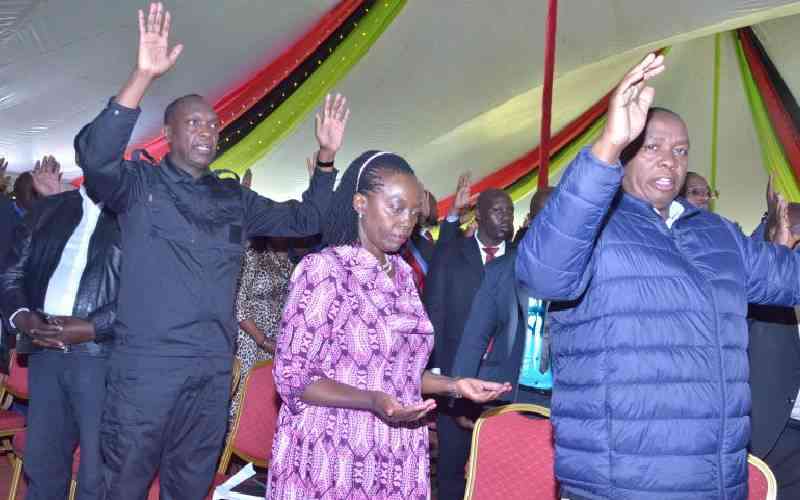
We are witnessing the return of ‘peculiar habits’ by politicians whose sights are set on 2027 polls.
There are ugly fights in UDA. Deputy President Rigathi Gachagua is feeling the heat from top allies of his boss William Ruto. It’s a moment of truth for the ‘truthful’ man.
That aside, the May 17 Limuru Three upshot was the hallmark of restlessness. Critics said it was tribal posturing. But in my view, the talks simply affirmed our freedoms of thought and association. As we defend free speech, it’s critical to reassess our perception of tribalism. How does meeting with one’s tribespeople for a chat become political belligerence or depraved ethnicity?
Freedom of association supports the right of individuals and communities to express their views. Author Chinua Achebe says in Things Fall Apart that tribal or community gatherings are not merely about sustenance but the intrinsic value of kinship. Achebe says: ‘A man who calls his kinsmen to a feast doesn’t do so to save them from starving. They all have food. When we gather in the moonlit village ground, it is not because of the moon. All can see it in their compound. We come together because it is good for kinsmen to do so.’
Unity and cultural preservation are vital yet misinterpreted in our political arena. We hear some tribes dominate State jobs and wield big political influence, but they shouldn’t be weaponised, dreaded or demonised in the quest for equity.
Tanzania’s John Magufuli once criticised Kenya for ‘overthinking’ tribes. They are just tribes. Let everyone meet whom they want as often, vent and bring up eye-opening ideas. If we detest tribal political meetings yet celebrate Ramogi nights, Turkana festival, Maasai Eunoto and the Maulidi festival, we must question our intentions.
Should we abandon our surnames? Or judge tribal grounds like Mukurwe wa Nyagathanga? While at it, we must reject political rhetoric that negatively exploits tribes. There was a time a vice chancellor from the ‘wrong’ tribe was ejected from a university. We also saw how tribalism tore us apart in 2007. Leaders using tribes to foster resentment must be called out.
Two things are important. First, let’s amend the National Cohesion and Integration Act to empower the National Cohesion and Integration Commission (NCIC) to promote positive tribal attributes while curbing divisive messaging. Instead of simplistic measures like changing ‘tribal’ names of places such as Nandi, Kisii and Kikuyu, we must change mindsets towards our diverse heritage.
Second, let’s ensure genuine public participation in decision-making, as enshrined in Article 1(2) of the Constitution and the County Governments Act. Public participation forums should not be a charade with predetermined outcomes, but platforms where citizens’ views shape policy.
The recent trend of leaders disregarding public opinions and saying this and that Bills will pass ‘mpende msipende’ undermines democracy and fuels tensions. By demanding accountability in public participation, we can mitigate scenarios where tribes resort to their own ‘Limuru’ corners in a bid to get things moving in their interest.
The public must push back on attempts to make public participation a mere formality. This is why it was refreshing to see Molo residents ‘dress down’ their MP Kuria Kimani, who’s also the National Assembly Finance Committee chairman, over proposals in the Finance Bill 2024. Wanjiku is becoming wiser by the day.
Ultimately, we should embrace constructive ethnicity. Tribal identity can be a source of strength rather than division. By fostering respect for diverse cultural expressions and ensuring meaningful public engagement that respects the law, we can navigate our political landscape with integrity.
The contours are changing. Let’s seek a nation where every voice counts, and every tribe valued for its contribution to our national identity. We can accommodate more useful ‘Limuru meetings’ but with an open mind. NCIC should look at these gatherings impartially without populism.
-The writer is a communications practitioner. Twitter(X): @markoloo